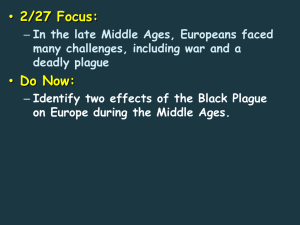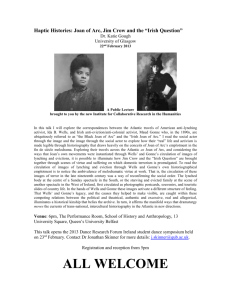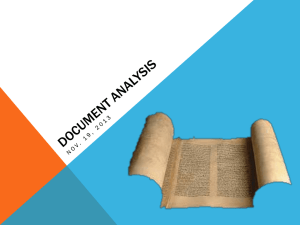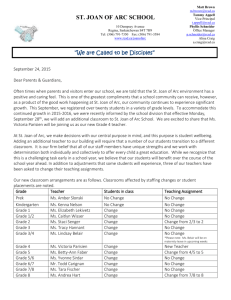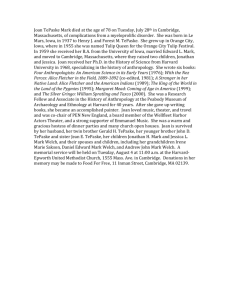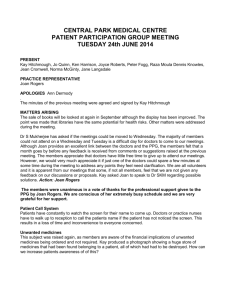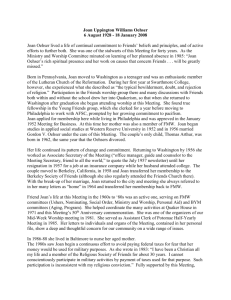WESTERN CIVILIZATION II
advertisement
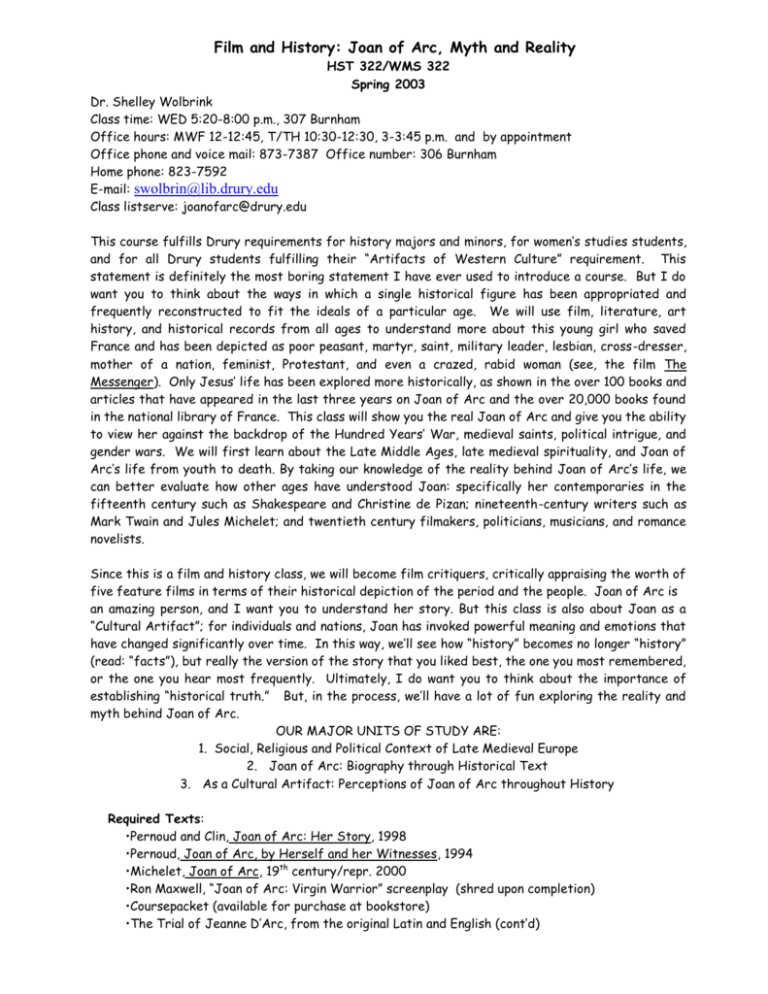
Film and History: Joan of Arc, Myth and Reality HST 322/WMS 322 Spring 2003 Dr. Shelley Wolbrink Class time: WED 5:20-8:00 p.m., 307 Burnham Office hours: MWF 12-12:45, T/TH 10:30-12:30, 3-3:45 p.m. and by appointment Office phone and voice mail: 873-7387 Office number: 306 Burnham Home phone: 823-7592 E-mail: swolbrin@lib.drury.edu Class listserve: joanofarc@drury.edu This course fulfills Drury requirements for history majors and minors, for women’s studies students, and for all Drury students fulfilling their “Artifacts of Western Culture” requirement. This statement is definitely the most boring statement I have ever used to introduce a course. But I do want you to think about the ways in which a single historical figure has been appropriated and frequently reconstructed to fit the ideals of a particular age. We will use film, literature, art history, and historical records from all ages to understand more about this young girl who saved France and has been depicted as poor peasant, martyr, saint, military leader, lesbian, cross-dresser, mother of a nation, feminist, Protestant, and even a crazed, rabid woman (see, the film The Messenger). Only Jesus’ life has been explored more historically, as shown in the over 100 books and articles that have appeared in the last three years on Joan of Arc and the over 20,000 books found in the national library of France. This class will show you the real Joan of Arc and give you the ability to view her against the backdrop of the Hundred Years’ War, medieval saints, political intrigue, and gender wars. We will first learn about the Late Middle Ages, late medieval spirituality, and Joan of Arc’s life from youth to death. By taking our knowledge of the reality behind Joan of Arc’s life, we can better evaluate how other ages have understood Joan: specifically her contemporaries in the fifteenth century such as Shakespeare and Christine de Pizan; nineteenth-century writers such as Mark Twain and Jules Michelet; and twentieth century filmakers, politicians, musicians, and romance novelists. Since this is a film and history class, we will become film critiquers, critically appraising the worth of five feature films in terms of their historical depiction of the period and the people. Joan of Arc is an amazing person, and I want you to understand her story. But this class is also about Joan as a “Cultural Artifact”; for individuals and nations, Joan has invoked powerful meaning and emotions that have changed significantly over time. In this way, we’ll see how “history” becomes no longer “history” (read: “facts”), but really the version of the story that you liked best, the one you most remembered, or the one you hear most frequently. Ultimately, I do want you to think about the importance of establishing “historical truth.” But, in the process, we’ll have a lot of fun exploring the reality and myth behind Joan of Arc. OUR MAJOR UNITS OF STUDY ARE: 1. Social, Religious and Political Context of Late Medieval Europe 2. Joan of Arc: Biography through Historical Text 3. As a Cultural Artifact: Perceptions of Joan of Arc throughout History Required Texts: •Pernoud and Clin, Joan of Arc: Her Story, 1998 •Pernoud, Joan of Arc, by Herself and her Witnesses, 1994 •Michelet, Joan of Arc, 19th century/repr. 2000 •Ron Maxwell, “Joan of Arc: Virgin Warrior” screenplay (shred upon completion) •Coursepacket (available for purchase at bookstore) •The Trial of Jeanne D’Arc, from the original Latin and English (cont’d) (www.fordham.edu/halsall/basis/joanofarc/trial.html) •Jeanne D’Arc, Maid of Orleans, Deliverer of France (Nullification/Rehabilitation Records) (www.stjoan-center.com) • Free online subscription to Joan of Arc Society listserve Course Objectives: 1. 2. 3. 4. 5. 6. To help students better visualize the past through a discussion of social and cultural history, and history as it relates to the lives of women. To examine and understand the historical record concerning Joan of Arc in order to fairly appraise the myth of Joan. To understand the place of gender when evaluating the life of Joan of Arc. To allow students to read the actual words and phrases of peoples who lived in the past: this means, read primary sources. To understand how historical interpretations are shaped by the spirit of the age (or the spirit of the filmmaker). To enhance critical thinking skills through discussion, presentations, formal writing, informal writing, and exams. Requirements 10% 15% 10% 54% 11% and Grading Policy: Quiz Final Exam Essay, Historical Consultant critique Group Presentation/Detailed Point Outline—Joan as Cultural Artifact Historical Critiques of films/literature (13.5% x4) General Classroom Participation: (Readings, Preparedness, Participation, Quizzes) Final grades are assigned according to a straight scale: 100-93 (A), 92-90 (A-), 89-87 (B+), 86-83 (B), 82-80 (B-), 79-77 (C+), 76-73 (C), 72-70 (C-), 69-67 (D+), 66-63 (D), 62-60 (D-), below 59 (F). However, students who make a clear contribution to class discussion by having completed the reading, by having thought about its meaning, and by revealing their preparedness through questions and dialogue will be rewarded in their final grades. Since attendance is required, unexcused absences will influence final class grades downward, especially borderline grades. Excused absences generally fall into the realm of serious crises—they do not include work, doctor’s appointments, or job interviews. Please also come to class on time. Whether intended or not, repeated late arrivals imply a general disinterestedness in the class. Significant absences--10% of our class meetings (1.5 absences or more)--will result in the dropping of the final class grade 5 points for every class missed. Daily learning is important to your education and maturation as a life long learner and it is important to me that you hear new points of view, interact with students and myself, and develop the confidence to speak about historical processes. Students concerned about their class grades should see me for individual direction on class improvement. Course Guidelines: CLASS PARTICIPATION and GENERAL CLASSWORK: This counts for 11% of your grade and it is an integral part of your grade. This is defined as participation in the class discussion of the assigned readings. Plan on expressing yourself and commenting on your reading in class during every meeting. If you excel here, I will reward you beyond the 10%. Bring the readings to class for discussion and analysis. Our classroom will be an open one, and I encourage you to vocalize your criticisms and invoke controversy, as long as it remains relevant to our themes of the class. Daily reinforcement through class discussion also significantly helps you on the major exams. Ask questions—this too is participation. Map quizzes, any general quizzes, and short response papers also go into this grade, but my primary evaluation technique is how well you are able to convey to me that you are doing your reading and thinking about it. Please see me (or e-mail me) throughout the year to receive feedback (or a grade) on how you are doing in this area. There is always the possibility of short, unannounced reading comprehension quizzes. If you have done the reading, this should be an easy A for all of you. Quizzes can be made up only with an excused absence (medical note, etc.). GENERAL COMMENTS ON WRITTEN WORK: What I prize above all in these essays is clarity of thought and expression, and your skill in reasoning and supporting your observations with direct references to the written word or visual work. You’ll want to be as specific as possible. Always include numerous citations that reveal your familiarity with the texts used in class. I have a standard grading sheet that will be handed back to you with comments. Please consult this sheet for my grading criteria (how an A differs from a B, etc.) All formal writing assignments are expected to be professional in nature, that is, typed, with traditional-size, academic font, one inch margins, page numbers, correct spelling, a staple, a meaningful title, and without typos. If these criteria are not met initially, I reserve the right to hand this paper back to you for revision (a late penalty will apply). I do not accept papers or assignments that are not stapled and I do not accept papers that are paperclipped; they must be stapled. This is not because of a generally cruel nature, but because your paper may get lost if it is not stapled OR other students’ papers will get attached to your paper clip and I will lose their papers (most of your professors here teach four classes, so we are dealing with a lot of papers!). MLA parenthetical citations can be used on all papers (period after parentheses). With two day’s advance notice, I will read and comment on all rough drafts (I will not assign a grade, but will make substantive comments to help you improve your grade). SPECIFIC GUIDELINES ON FILM/LITERATURE EVALUATIONS: This portion of your grade represents the largest component of your grade. I consider it highly important as we have few other evaluations in this class; consider these written assignments as seriously as you might a midterm, as they prove to me your understanding of they myth and reality behind Joan of Arc. You must complete 4 of these assignments throughout the year (worth 13.5% each). 1) Henry V 2) Jehanne la Pucelle 3) The Messenger 4) Literary Texts. They are always to be due one week after finishing discussion on the film or book (you cannot go back and choose an earlier one at a later date). Please use as a guideline the handout for evaluating film and literature to help gain ideas for the papers— which should be about 5 pages in length. The basic question to answer is: HOW ACCURATE IS THE FILM OR BOOK? How fair is the historical representation of Joan of Arc and of the time period? Notice that I did not write—“did you like the film or book?” We are evaluating each work historically, and it might help to put yourself in the seat of a movie or book reviewer. In order to answer the question, I want you to use your own knowledge of Joan from me, our books, our discussion and incorporate it into your paper. In this way, the paper shows me how thoroughly you are beginning to understand the time period. The class is designed so that we generally learn the history, then watch the film. CLASS EVALUATIONS OF FILM: After each film or work of literature, I will ask for a personal score from each of you as you consider the historical accuracy of the film. I want you to come up with a number between 1 (least) and 10 (best) on your own, and an justification. After you write the number down, we will discuss the scores as a group. This exercise is intended to make our viewing and reading active (rather than passive), and to help build your evaluative skills as a critiquer of film and literature. LISTSERVE REQIREMENT: Sign up to receive listserve messages from members of the International Joan of Arc Society and read the messages. I want you to understand the effect that Joan of Arc has on people around the world and to take part in the dialogue being established about Joan of Arc. Extra credit to class members who either post a message or respond to a message sometime during the semester. How to subscribe: 1. email the following two words to majordomo@seas.smu.edu: subscribe joanofarc (make sure it is written just like shown with no other marks and separated into two words only) 2. Wait or come back soon to receive another message from the server; you must confirm your email address within 24 hours. The first message is just to confirm that you must send something back. The second message is the important one: it lists an authorization number. Click “reply to message” on your screen and then your next task is to send back the authorization number plus a bit more. I just deleted all info surrounding the number and words and sent it back. This is the easiest method because it is already set up perfectly by the server. 3. To unsubscribe at the end of the year (if you choose!!), email the following two words to majordomo@seas.smu.edu: unsubscribe joanofarc. QUIZ/FINAL EXAM: Count for 10 and 15% each. Because of the nature of this class, much less emphasis will be given to midterms and finals than other projects. The information you are learning about Joan of Arc should come out in your analysis papers, so please view these papers as tests. The midterm will be more a test of knowledge and reading; the final paper will be an essay to Ron Maxwell. RESEARCH/ANALYSIS PROJECT (Individual or Group): This counts for a total of 10% of your grade. The topics are listed below. You will be graded on your work with the group, on your oral presentation, and on your detailed POINT OUTLINE with MLA citations where needed. Turn in a bilbliography where needed. Topics Written texts: George Bernard Shaw’s Joan of Arc (St. Joan, 1957) Carolyn Cage’s Joan of Arc Wishbone Classics’ Joan of Arc Mark Twain’s Joan of Arc Rehabilitation Records in more detail Trial Records in more detail Thematic Topics: Joan as Saint Joan as Leader Joan as Warrior Joan as Symbol of France (National Unity/Nationalism) Joan as Lesbian Joan as Cross Dresser/Transvestite Joan as Religious Martyr Joan as Simple, Ignorant Shepherdess Joan as Mystic and Prophet to the People Joan as Royal Bastard Joan as Feisty Woman/Feminist If you decide to do a thematic analysis, I want you to explore a theme within Joan of Arc studies from Joan’s lifetime through today, or analyze a written work, providing a detailed review. Describe, Analyze, Research, and Prove or Disprove one of “stereotypical” views of Joan of Arc. You will use a lot of the material we have gone over in class, so in this respect I do not view this assignment as a true research paper. Your presentation—Group evaluations will be conducted for all members of the group. It is up to the group to meet to get going on the project. DO this early! Provide quotations to the audience to share relevant passages. See research presentation sheet in your coursepacket. Very generally: One half of this grade will be your research (How much work was conducted for the presentation? Were you able to condense this research into your own thoughts and style?); the other half will be how you present the information (In general, did you work to provide an easy to understand presentation for your audience that was organized and informative? Did you include the significance of your topic? Did you convey enthusiasm?). Your sources: I take seriously the nature of your sources—they should be academic and comprehensive. I want to feel comfortable that you checked a variety of outlets for your paper. Start early. Part of being a historian is using resources to elicit information. The excuse that Drury’s library is so small doesn’t really work as you have access to the libraries of over 40 institutions with MOBIUS (no charge, takes 2-3 days) and ILL (a small charge, takes about a week). The following is intended to help you realize the vast array of outlets available to you as you complete your paper. 1. Drury Electronic Services: (You will need the password to access; check at information desk) WorldCat--books Article First--articles Ebsco Host—articles MOBIUS Interlibrary Loan will get books for $1.00 for you and articles for $2.50, if we do not possess the title you are looking for. 2. At Olin Library: Card Catalog Computer Catalog Encyclopedia Britannica—Macropedia (look in index) and others up-to-date—this is really the only scholarly multi-volume encyclopedia. Please do not use those wimpy, web-based encyclopedias. 3. Websites: particularly, www.northernlight.com;www.altavista.com. These sites have the largest search engines; try them both. www.drury.edu/Olin/subjects/history.html has links to history sites. But exercise caution. Websites can be biased and often factually inaccurate. Do not rely heavily on websites; generally, they do not represent serious scholarship and are looked upon by professors as an easy way of getting out of doing real research and reading actual books by scholars in the field. Check the authorship of the website, and, if in doubt, print it out and send over my way. 4. SMS Library: Access their computer catalog at Olin library or go to library directly. 5. Bibliographies of Books: Look at the end of books for other books and articles on your topic. If we do not carry them, and they seem to be important, think seriously about ordering from Interlibrary Loan. There is a small fee, but sometimes it is worth it. It does not take long for the books or article to arrive. DEADLINES for papers and assignments should be adhered to. If turned in late, the penalty is one half of an entire letter grade drop for the first day late (on a 100 point scale, five points, an 83 to a 78); an entire grade down after the first day late. A late paper is defined as any paper turned in after the official due time, even if it is still turned in that afternoon. Note: I cannot make exceptions after the due date, nor the day before, but I am flexible if you talk to me beforehand and have an excuse. At the latest, papers will only be accepted one week from their original due date, since I have by then handed back the assignment to the other students. COMPUTER PROBLEMS HAPPEN! BEWARE!! Computers unfortunately are not sympathetic creatures. Please follow this advice in order to cut down on Computer Problems: 1) Save repeatedly on two disks 2) Print out a copy of your paper after every new page is written 3) Finish your paper earlier than its due date. If you do encounter a printing problem that makes you unable to turn in an assignment, I will be sympathetic (unlike a computer), but please show me your paper as it has taken shape thus far (follow rule number 2). E-MAIL ACCOUNTS: It is a requirement of this course that you have a Drury e-mail account and that you check it regularly. A class list-serve will be established so that I may contact you concerning assignments and schedule changes. Plan on checking it Monday mornings for possible info on the class. ACADEMIC MISCONDUCT: Please see your academic handbook for the college-wide policy. My policy is a “0” on the assignment and a letter to the Dean of Academic Affairs detailing the nature of the academic misconduct. If you have any questions at all on this subject, please see me before the assignment is turned in. Among other things, I consider academic misconduct to involve the following: cheating plagiarism using an identical or even a similar paper for two different courses; presentations as well. submitting the same answers or the same paper as someone else in class using ideas other than your own and failing to cite where these ideas came from (very common) purchasing a research paper for use and incorporation into your own research turning in a paper or portion of a paper completed by someone else using the same words or sentence structure as another author without putting those words or that sentence into quotation marks and referencing the author (also very common) Note: the copying of words and sentence structure directly from textbooks, monographs, and the internet without citations is plagiarism; the copying of words and sentence structure directly from textbooks, monographs and the internet even with citations is still considered plagiarism—unless you place these words or sentences in quotation marks. Use your own words and your own sentence structure; cite all ideas that you did not know before starting the paper. BOOKS ON RESERVE: Western Civilization textbooks are on reserve at the library under my name, if you find that you need additional historical background as well as many of the library’s books on Joan of Arc. Class Schedule and Reading Assignments (complete for day of class): Wednesday January 22 Hellos and Syllabus; Begin Discussion of Research/Analysis Paper; Film Evaluation Noah’s Wife, Bone of Arc, and other aspects of Johannine Popular Culture CP, Handout on Evaluating Film. BEGIN UNIT ONE Social, Political, and Religious Contexts of Medieval Europe Wednesday January 29 Introduction to the Late Middle Ages, Historical Timeline, Geography The Late Medieval Church, Religious Beliefs, and Female Mysticism Documentary: A&E, “The Virgin Warrior” (1999) DUE: 1 page, typed, describing any memories, knowledge, images you have of Joan of Arc. Do not look up info—just tell me what’s happening in your head as you close your eyes and think about Joan of Arc. DO After Writing Assignment: 1. Subscribe to Joan of Arc listserve. See instructions in syllabus guidelines. 2. Visit www.dc.smu.edu/ijas (international joan of arc society, can also subscribe to listserve here) and www.stjoan-center.com (Joan of Arc center, Albuquerque, NM). 3. READ: Pernoud and Clin, “Iconography of Joan of Arc,” and “Joan of Arc in Folklore,” 240-244. Coursepacket (CP), “Why the Middle Ages Matter,” 1-4; short biography of Joan of Arc, Dictionary of the Middle Ages; Henrietta Leyser, “Lay Piety,” 222-239; Joseph Lynch, “The Framework of the Christian Life,” 256-273. Wednesday February 5 The Hundreds’ Year War and Medieval Warfare READ: CP, Dictionary of the Middle Ages, “Hundred Years War,” 331-335. Michelet (actually, translator’s notes), 124-129 and view dynastic chart in beginning of book; Pernoud and Clin, 1-6; Philip Warner, “Weapons of Attack and Defense,” 47-69; “A Castle at War,” 71-91; “The Castle at Bay,” 218-224. DUE: Paper topics, # 1-3 choices (see topics twd. end of syllabus). Let me know if you would like to be in a group, a pair, or not. Wednesday February 12 Film: Henry V/Kenneth Branaugh **Use this film to get into the mindset of English vs. French, the beg. of nationalism, medieval warfare, the importance of a charismatic leader, and medieval life, while understanding that Shakespeare, the author, and Branaugh, the producer, are decidedly English. How would this film have been made differently from a French perspective? READ: Pernoud and Clin, “Charles VII,” 167-168, and “Henry VI,” 168-169; CP, Froissart’s accounts of battles; article on Battle of Agincourt; Begin for next week the Joan of Arc reading—Pernoud, “Origins and Childhood,” 15-29, and “Vocation and Departure,” 30-45. **This is Critique # 1. **pass out hand-out, Inquisition. Wednesday February 19 The Medieval Inquisition, Heresy, and Women in the Middle Ages Excerpt from documentaries on the Inquisition/Women in the Middle Ages READ: CP, Henrietta Leyser, “Women at Work,” 142-167. “Magic and the Inquisition,” 1; Visuals, Women and Witchcraft. DUE: Paper on Henry V. Critique #1 required. All feature films represent opportunities for film analysis and critique. BEGIN UNIT TWO Joan of Arc: From Village Life to Military Leadership Wednesday February 26 Joan’s Path to the King: From Childhood to Coronation Start: Jeanne la Pucelle (Part One: The Battles), 1994: Jacques Rivette’s version READ: Pernoud and Clin, “Joan as Memory,” 159-164; “Joan meets her Dauphin,” 15-31; “Her Story Begins,” 9-14; “Joan and the Victory at Orléans,” 33-51; visuals around 165 and 166; Pernoud, “Origins and Childhood,” 15-29; Vocation and Departure, 30-45. IN-CLASS READING: Pernoud, “Joan before the Dauphin,” “Orleans,” Poitiers Conclusions; Letter to the English. **Bring both Pernoud books to class. Wednesday March 5**Terms for Short ID Quiz passed out From Coronation to Capture Continue with Jeanne la Pucelle (Part One: The Battles) READ: Pernoud and Clin, “Her Dauphin,” 53-68; “Intrigue,” 69-88; Pernoud, “The Road to Reims,” 108127; Pernoud, Rheims to Compiegne, 139-164. IN CLASS: Pernoud, Rheims to Compiegne, 128-139 top. Wednesday March 12 Quiz (brief 30 minute quiz) Imprisonment and Trial Finish Jeanne la Pucelle (Part One: The Battles) READ: Pernoud and Clin, “Joan the Prisoner,” 89-99; “Joan’s Trial and Execution at Rouen,” 103-128; “Pierre Cauchon,” 208-211. **Critique# 2 due March 12, March 15, or March 29th. Can slip under my door, if you want. Wednesday March 19—no class/Spring Break Wednesday March 26 Trial and Death of Joan of Arc in the Records End of Class: Excerpt from Jehanne la Pucelle, (Part 2: The Trials), Jacques Rivette READ: Pernoud, “Trial of Condemnation,” 165-227; Pernoud, “Death,” 228-254; Pernoud and Clin, “Execution at Rouen,” 129-137. **Bring your copy of the trial records to class tonight BEGIN UNIT THREE As a “Cultural Artifact”: Perceptions of Joan of Arc throughout History Wednesday April 2 The Fifteenth Century --Christine de Pisan, Shakespeare, the “False Joans,” and the Rehabilitation Trial READ: Pernoud, bottom 255-277; Pernoud and Clin, “The Verdict of Rouen Nullified,” 139-158. CP, Christine de Pisan’s Ditié of Jehanne d’Arc; Johann Nider on Joan of Arc; Shakespeare’s Henry VI, Part One (Joan’s words checked, OK); Lightbody, “Epilogue,” 164-171; Michelet, 3-22. IN CLASS: Read Raphael Holinshed, hand-out. **bring to class Rehabilitation Trial records Wednesday April 9 A Skip to the Twentieth Century--The Messenger: A Story of Joan of Arc (148 minutes, 2000), Luc Besson’s Vision READ: Michelet, 22-93. READ: 30 pages of text for presentation project; or conduct research on your topic. DUE: One paragraph statement on your project. Critique #3 assignment, due next week Arrange to meet with your group Thursday or Friday to discuss project. How will you convey the work to the student audience? Advice?: use quotations; have overall analysis in beginning and the end; split up tasks between all members of the group. Wednesday April 16 Discussion of Michelet’s Joan of Arc Film: The Passion of Joan of Arc, 1928/Carl Dreyer’s vision—A silent film; “One of the Greatest Films of the World” READ: Finish Michelet, 93-122; prepare for discussion of book and presentation. DUE: Paper on the Messenger. IN CLASS: Friedrich Schiller, Die Jungfrau von Orleans (The Maiden of Orleans) Wednesday April 23 Research Presentations—Joan as Cultural Artifact Cont’d Begin Joan of Arc (1999), CBS’ Vision READ: CP, Essay from beginning of Bernard Shaw’s St. Joan, 1-25 (What points does Shaw make that you agree with? What points are controversial?); Carolyn Cage, “The Second Coming of Joan of Arc”, 5-34; Mark Twain, Translator’s preface, 160, 445-457, 461 end; Wishbone Classics excerpt. Wednesday April 30 Joan’s Canonization Finish Joan of Arc (1999), CBS’ Vision READ: CP, Lightbody, “Epilogue,” 156-164; Pernoud and Clin, “Beatification and Canonization,” 245; Official Proclamation of Canonization; Henry Ansgar Kelly, “Joan of Arc’s Last Trial: The Attack of the Devil’s Advocates, 205-236. DUE: Final Critique; Analysis of literary text representations of Joan using anything we’ve read thus far and your own group project text (choose at least three texts). Reminder: Assign character parts for play-- Wednesday May 7 An Epic? Ron Maxwell’s screenplay READ: Finish the screenplay Final Exam: Wednesday evening, take home essay due on Maxwell screenplay *This syllabus is subject to modifications
